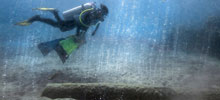Originally published January 28, 2014 at 5:36 PM | Page modified January 29, 2014 at 12:04 AM
Super duped: Cracking down on counterfeit fan gear
Selling Super Bowl gear is big business, and so is faking it. Agencies are trying to find unlicensed apparel and shut down those who make it.
Seattle Times staff reporter
![]()
NEW YORK — The black Suburban pulls up to the curb, and two men jump out and head down Broadway in search of Super Bowl merchandise.
Every block or so, the duo, clad in nondescript winter jackets, wool caps and with one toting a backpack, browses clothing displays set up by sidewalk street vendors. They aren’t fans in search of gear, though. They are undercover Homeland Security officers from the department’s Immigration and Customs Enforcement (ICE) branch, making spot checks for counterfeit Seahawks, Broncos and other NFL apparel related to Sunday’s big game.
None of the vendors on this stretch of Times Square is found to be selling unlicensed goods. But one of the agents later pulls a Marshawn Lynch jersey from a large trash bag inside the Suburban, part of Tuesday’s haul from similar street-level checks made throughout the city.
“It’s just poor-quality stitching on it,’’ he says, showing loose threads hanging off the fake Lynch jersey’s seams. “And the fabric itself is very flimsy compared to the professional-quality stuff.”
Sports merchandising is big business, especially around major events like the Super Bowl. A record $17.2 million worth of fake NFL merchandise was seized in the months before last year’s Super Bowl in New Orleans by ICE officials, working with the U.S. Postal Inspection Service, U.S. Customs and Border Protection and state and local police.
Many of the goods are manufactured in China, shipped to warehouses here at cost and sold to retailers at a markup. Some retailers are merely ignorant of rules requiring official NFL authenticity tags on merchandise being sold, while others willingly sell fake jerseys, caps, sweaters and jackets because they know consumers will flock toward a perceived bargain.
“They think they’re getting a deal, but the reality is, they find out after about one or two times through the wash that it wasn’t worth what they paid for it,’’ says James Hayes, special agent in charge of Homeland Security Investigations for New York. “That’s when the stitching falls apart or the logo starts to fade and all of a sudden, they realize the small difference they saved on price wasn’t worth the hassle because they have to go out and buy a whole new shirt.’’
While technology has made it tougher to tell fakes from the real thing, officials say poor stitching is usually an easy giveaway, as are misspellings of athlete and team names on the items.
Hayes says jerseys for Lynch and Russell Wilson were the most popular Seahawks counterfeits seized.
“Maybe Richard Sherman can come on strong this week and crack the top three,’’ he quips.
All kidding aside, Hayes expects the counterfeiting around this Super Bowl to surpass last year’s in New Orleans, given the sheer size of New York City. The multiagency crackdown effort — dubbed Operation Team Player — has spent months conducting raids on warehouses, suppliers, retailers and street vendors in the lead-up to this year’s game, while also targeting a growing stream of online websites hawking counterfeit wares.
Last July, a New York federal judge awarded the NFL a $273 million default judgment against operators of more than 1,000 websites selling counterfeit merchandise. The NFL alleged that a group of individuals operated scores of websites “under a number of inconsistent and false identities in order to avoid liability.’’
MarkMonitor, a company that specializes in protecting brands against online fraud and piracy, helps the NFL identify and shut down infringing websites.
“Everybody gets a black eye if somebody buys a jersey, or a sweatshirt or piece of memorabilia and it falls apart or fades or bleeds or contains toxic materials,’’ says Fred Felman, the company’s chief marketing officer.
Felman says identifying who runs the sites can be tricky, especially with some handled offshore and cloaked in layers of secrecy.
“A lot of times, these sites that sell counterfeit goods are run by very organized people,’’ Felman says. “They might not just have one or two or three sites. They might have one or two or three hundred sites all tied together in some way. We investigate and figure out what ties them all together.’’
One trick he says rogue websites use is domain names that reference the NFL or its teams. This makes the sites appear more legitimate and generate high rankings on Internet searches.
Last summer’s NFL lawsuit stated that offending websites used names like “nflshopsclearance.com’’ and “newyorkgiantsproshop.com’’ as URLs to lure consumers.
Felman says lawsuits are a relatively quick way to get such websites taken down. MarkMonitor also works with Internet service providers and online payment companies to get rid of search advertising — in pictures, recipes, blogs, social media — that can lead consumers unwittingly to sites selling unlicensed goods.
“The No. 1 rule for us is, if you can’t find it, you can’t shop there,’’ he says.
Shoppers can help themselves, he adds, by checking a website’s address bar and name to make sure there aren’t any intentional misspellings, or very long URLs. Consumers also should use common sense if merchandise appears priced too cheaply.
Still, just as some street vendors are now selling unlicensed items with authentic-looking NFL tags, online peddlers are seeking more creative ways to dupe consumers.
“It’s a wild, wild world out there,’’ Felman says.
Geoff Baker: 206-464-8286
or gbaker@seattletimes.com.
On Twitter @gbakermariners













